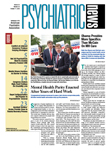Newborns who have been exposed to selective serotonin-reuptake inhibitors (SSRIs) in the womb may be at risk for irregular heart rate, according to an observational study published in the September Pediatrics.
Between 2000 and 2005, 52 newborns whose mothers took SSRIs at the onset of labor had a significantly longer QTc interval (QT interval standardized by adjusting for heart rate) than 52 healthy controls with matched gestational health born to mothers not taking any medication just before delivery.
The QTc interval in the newborns of mothers who took SSRIs was 409 ± 42 milliseconds, mean ± standard deviation; in the control infants whose mothers did not take an SSRI, the interval was 392 ± 29 milliseconds. A QTc interval of greater than 460 milliseconds was defined as pathologically prolonged.
“Prolongation of the QT interval,” the authors noted, “is a risk factor for sudden death.” The phenomenon has been reported in adults and children taking SSRIs, especially those who overdosed on these drugs, although the risk for arrhythmia is much lower compared with tricyclic antidepressants and generally considered safer.
Among the exposed newborns, five (10 percent) had a pathologically prolonged QTc interval, with the longest interval being 543 milliseconds. None in the control group had QTc intervals longer than the cutoff, and the rate of having QTc intervals greater than 460 milliseconds in the healthy newborn population was only about 1 percent. All five infants' QTc intervals normalized later, the authors discovered from their medical charts, and all were completely healthy by one year of age.
Although the study was not a randomized, controlled clinical trial, the data were collected from all newborns prospectively and thoroughly evaluated at the Rabin Medical Center Department of Neonatology in Israel. The medical center is affiliated with the International Clearinghouse for Birth Defects Monitoring System and routinely conducts detailed physical, cardiorespiratory, and other examinations on all newborns whose mothers took psychoactive or cardiovascular medications during pregnancy.
The first electrocardiograms (ECGs) were performed on these newborns three to 96 hours after delivery, and all the ECG results were read by one experienced pediatric cardiologist, who was blinded to each subject's exposure to SSRIs.
To minimize other confounding factors, the authors excluded from their analysis newborns whose mothers were taking any other medications for chronic illness, whether they are known to prolong QT interval or not, during pregnancy. Mothers who had gestational diabetes or hypothyroidism were also excluded. The authors included only newborns with a gestational age of at least 35 weeks, in good general health (Apgar scores greater than 7 at one and five minutes), and without structural heart abnormalities.
Before additional research data demonstrate whether maternal use of SSRIs lead to clinically significant arrhythmias, the authors suggested that“ clinicians should be aware of the phenomenon” and that“ screening ECGs be considered in newborns exposed to SSRI antidepressants.” Infants with prolonged QTc intervals should have“ continuous cardiac monitoring until the abnormality resolves.”
SSRIs and their active metabolites are known to cross the placenta to reach the fetus and can be detected in the amniotic fluid. Classified as Category C drugs in the FDA criteria, SSRIs are not known to be teratogenic, but in-utero exposure has been associated with complications including lower birth weight, respiratory problems, pulmonary hypertension, and other complications, according to the drugs' package inserts.
An abstract of “Antenatal Use of Selective Serotonin-Reuptake Inhibitors and QT Interval Prolongation in Newborns” is posted at<pediatrics.aappublications.org/cgi/content/abstract/122/3/e710>.▪
